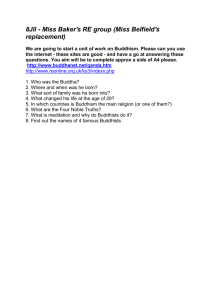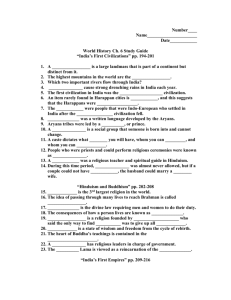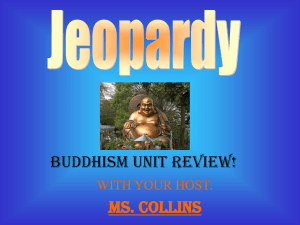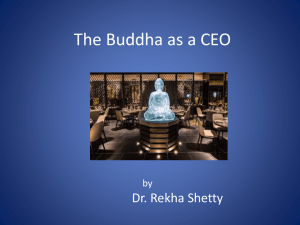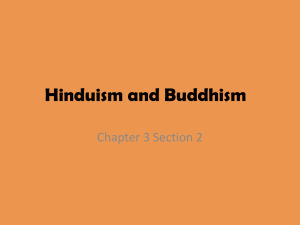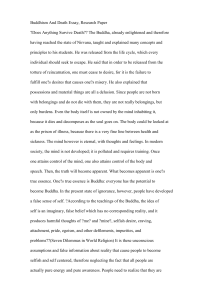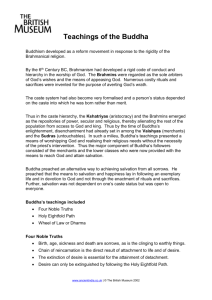1.Buddhism
advertisement
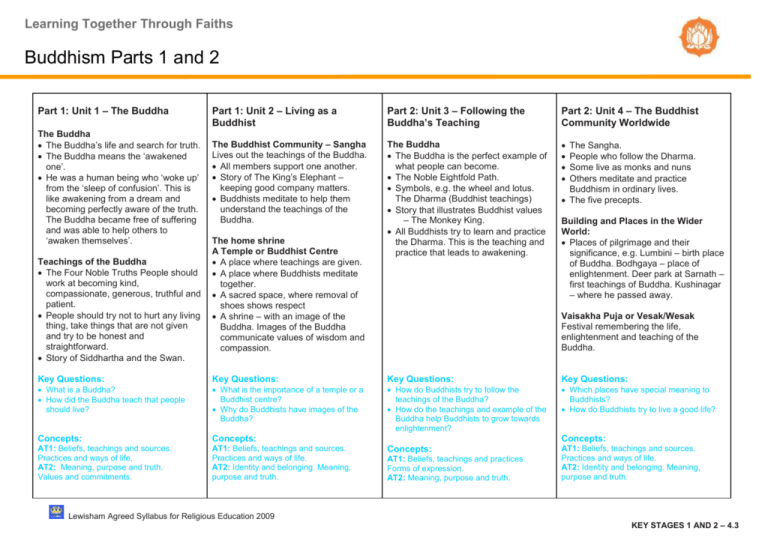
Learning Together Through Faiths Buddhism Parts 1 and 2 Part 1: Unit 1 – The Buddha The Buddha The Buddha’s life and search for truth. The Buddha means the ‘awakened one’. He was a human being who ‘woke up’ from the ‘sleep of confusion’. This is like awakening from a dream and becoming perfectly aware of the truth. The Buddha became free of suffering and was able to help others to ‘awaken themselves’. Teachings of the Buddha The Four Noble Truths People should work at becoming kind, compassionate, generous, truthful and patient. People should try not to hurt any living thing, take things that are not given and try to be honest and straightforward. Story of Siddhartha and the Swan. Part 1: Unit 2 – Living as a Buddhist Part 2: Unit 3 – Following the Buddha’s Teaching Part 2: Unit 4 – The Buddhist Community Worldwide The Buddhist Community – Sangha Lives out the teachings of the Buddha. All members support one another. Story of The King’s Elephant – keeping good company matters. Buddhists meditate to help them understand the teachings of the Buddha. The Buddha The Buddha is the perfect example of what people can become. The Noble Eightfold Path. Symbols, e.g. the wheel and lotus. The Dharma (Buddhist teachings) Story that illustrates Buddhist values – The Monkey King. All Buddhists try to learn and practice the Dharma. This is the teaching and practice that leads to awakening. The home shrine A Temple or Buddhist Centre A place where teachings are given. A place where Buddhists meditate together. A sacred space, where removal of shoes shows respect A shrine – with an image of the Buddha. Images of the Buddha communicate values of wisdom and compassion. The Sangha. People who follow the Dharma. Some live as monks and nuns Others meditate and practice Buddhism in ordinary lives. The five precepts. Building and Places in the Wider World: Places of pilgrimage and their significance, e.g. Lumbini – birth place of Buddha. Bodhgaya – place of enlightenment. Deer park at Sarnath – first teachings of Buddha. Kushinagar – where he passed away. Vaisakha Puja or Vesak/Wesak Festival remembering the life, enlightenment and teaching of the Buddha. Key Questions: Key Questions: Key Questions: Key Questions: What is a Buddha? How did the Buddha teach that people should live? What is the importance of a temple or a Buddhist centre? Why do Buddhists have images of the Buddha? How do Buddhists try to follow the teachings of the Buddha? How do the teachings and example of the Buddha help Buddhists to grow towards enlightenment? Which places have special meaning to Buddhists? How do Buddhists try to live a good life? Concepts: Concepts: AT1: Beliefs, teachings and sources. Practices and ways of life. AT2: Meaning, purpose and truth. Values and commitments. AT1: Beliefs, teachings and sources. Practices and ways of life. AT2: Identity and belonging. Meaning, purpose and truth. Concepts: Concepts: AT1: Beliefs, teachings and practices. Forms of expression. AT2: Meaning, purpose and truth. AT1: Beliefs, teachings and sources. Practices and ways of life. AT2: Identity and belonging. Meaning, purpose and truth. Lewisham Agreed Syllabus for Religious Education 2009 KEY STAGES 1 AND 2 – 4.3 Learning Together Through Faiths Buddhism in the Thematic Units Right and Wrong The Journey of Life and Death The Buddha taught people how to behave through stories. The story of the Lion and the Jackal The ways in which human experiences associated with death, loss, hope, and meaning in life are understood in Buddhism. Actions have consequences; good actions have good consequences All things change Beliefs about death and rebirth. Key Questions: Key Questions: What is the meaning of the story for What do Buddhists believe happens after Buddhists and for everyone? How do stories help us to explore our own beliefs and values? What do Buddhists believe the purpose of death? life to be? How do Buddhists support people during times of loss? Concepts: AT1: Beliefs, teachings, practices. AT2: Meaning, purpose and truth. The London Buddhist Centre Concepts: AT1: Beliefs, teachings, practices. AT2: Meaning, purpose and truth. Lewisham Agreed Syllabus for Religious Education 2009 KEY STAGES 1 AND 2 – 4.4



